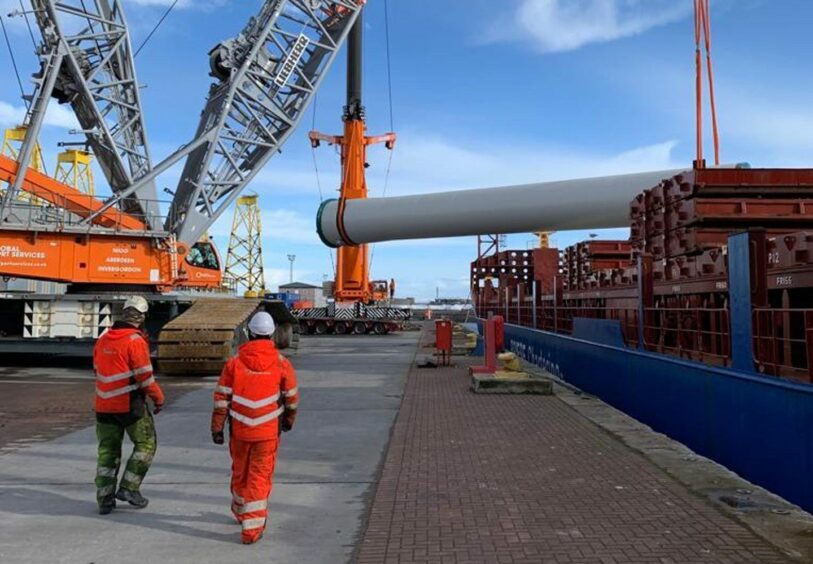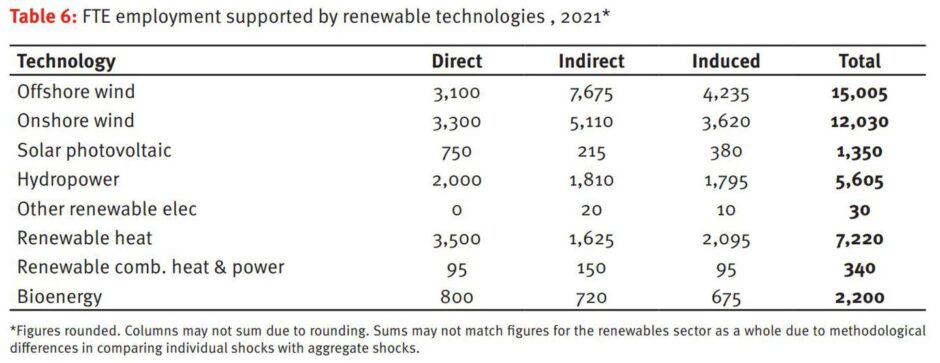 © Supplied by Global Wind Projects
© Supplied by Global Wind Projects The clean energy industry supported the equivalent of just under 43,000 Scottish jobs in 2021, according to new estimates published by Scottish Renewables.
A new report, prepared for the trade body by the University of Strathclyde’s Fraser of Allander Institute (FAI), suggests the sector contributed over £10 billion of economic output across the Scottish economy and supported an estimated 42,920 full-time roles in 2021.
The report uses financial modelling to estimate the impact of the renewable energy industry, as it is not currently defined in national statistics.
Those figures suggest the sector itself had a turnover of £6.1bn and 13,600 direct full-time equivalent (FTE) jobs in 2021, the latest year for which data is available. Nearly half this turnover is derived from the electricity and gas sector.
FAI points to a “notable year-on-year increase” in the results compared with the roughly 8,500 FTE roles estimated for the previous year – a change it attributes largely to a “substantial surge” in Office for National Statistics (ONS) data on offshore wind turnover in 2021.
The industry also purchases goods and services from firms in their supply chain, which in turn generates other employment and economic impacts. It’s these ‘indirect’ and ‘induced’ effects which produce the headline figure, as well as estimated gross value added (GVA) of over £4.7bn.
The technologies that individually support the most FTE jobs are offshore wind (10,120), onshore wind (12,030), renewable heat (7,220) and hydropower (5,605).
Economic analysts produced similar rankings, with offshore wind responsible for the largest share at £4bn of estimated output.
Yet FAI also warns against “overinterpreting” these findings, noting that its margin of error and the “continued challenges of economic measurement” in the wake of the Covid-19 pandemic add a degree of uncertainty to the data.
It therefore reiterated its call for “more robust and timely” production of renewables data by both UK and/or Scottish Governments to enable “more meaningful” annual and technology comparisons of estimates.
It comes a amid a wider debate over the classification of so-called green jobs, the number of which fell by some 3.5% between 2018 and 2020, according to ONS data released earlier this year.
Scottish Renewables chief executive Claire Mack said: “The renewable energy industry is the biggest economic opportunity we have in Scotland so it is really encouraging to see the Fraser of Allander Institute’s report reflect the positive impact our sector is having on jobs and economic output.
“While our members continue to focus on delivering the projects we will need to meet our climate ambitions, as an industry we want to clearly demonstrate how we are benefiting not only Scotland’s but the UK’s economies as we transition to a net-zero future.
“To do this we urgently need much more robust data collection to understand how the renewable energy industry is performing and evolving across the UK.
“The UK and Scottish Governments urgently need to enable better data to be collected on the renewable energy sector that will support transparency and accountability as our industry moves towards reaching its economic and environmental targets as part of a just energy transition.”
FAI director professor Mairi Spowage added: “Our latest report shows the significant contribution that renewables make to Scotland’s economy. These opportunities include the potential for technological development, new export markets and prosperity for rural parts of Scotland that may otherwise be left behind in the transition away from fossil fuels.
“However, these opportunities do not provide prosperity in themselves. As Scotland positions itself as a leader in sustainable development it is important that government and industry can collaborate on establishing robust data to assess progress to ensure that Scotland fully leverages its renewable potential.”

